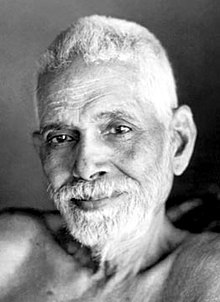 Ramana Maharshi when he was about 60 years old | |
| Born | Venkataraman Iyer 30 December 1879 Tiruchuzhi |
|---|---|
| Died | 14 April 1950 (aged 70) Sri Ramana Ashram in Arunachala |
| Philosophy | Advaita Vedanta |
| Quotation | Of all the thoughts that rise in the mind, the thought 'I' is the first thought. |
Despite this veneration, Ramana did not publicize himself as a guru, never claimed to have disciples, and never appointed any successors.
While a few who came to see him are said to have become enlightened through association, he did not publicly acknowledge any living person as liberated other than his mother at death.
During a court case over the management of the ashram, Ramana declared himself an atiasrama, beyond all caste and religious restrictions, not attached to anything in life.
Ramana was noted for his belief in the power of silence and his relatively sparse use of speech, as well as his lack of concern for fame or criticism.
Ramana was noted for his unusual love of creatures and plants.
On the morning of June 18, 1948, he realized his favorite cow Lakshmi was near death. Just as he had with his own Mother, Ramana placed his hands on her head and over her heart. The cow died peacefully at 11:30 a.m. and Ramana later declared that the cow was liberated.
Ramana was noted for his belief in the power of silence and relatively sparse use of speech. He led a modest and renunciate life.
However, a popular image of him as a person who spent most of his time doing nothing except silently sitting in samadhi is highly inaccurate, according to David Godman, who has written extensively about Ramana.
According to Godman, from the period when an Ashram began to rise around him after his mother arrived into his later years, Ramana was actually quite active in Ashram activities such as cooking and stitching leaf plates until his health failed.
Other typical features were:
- He charged no money, and was adamant that no one ever ask for money (or anything else) in his name;
- He never promoted or called attention to himself. Instead, Ramana remained in one place for 54 years, offering spiritual guidance to anyone of any background who came to him, and asking nothing in return;
- He considered humility to be the highest quality;
- He said the deep sense of peace one felt around a jnani was the surest indicator of their spiritual state, that equality towards all was a true sign of liberation, and that what a true jnani did was always for others, not themselves.
Carl Jung regarded Ramana Maharshi not to be an "isolated phenomenon" , but a token of Indian spirituality, "manifest in many forms in everyday Indian life":
Source:
Ramana Maharshi - Wikipedia, the free encyclopedia
http://en.wikipedia.org/wiki/Ramana_Maharshi
No comments:
Post a Comment